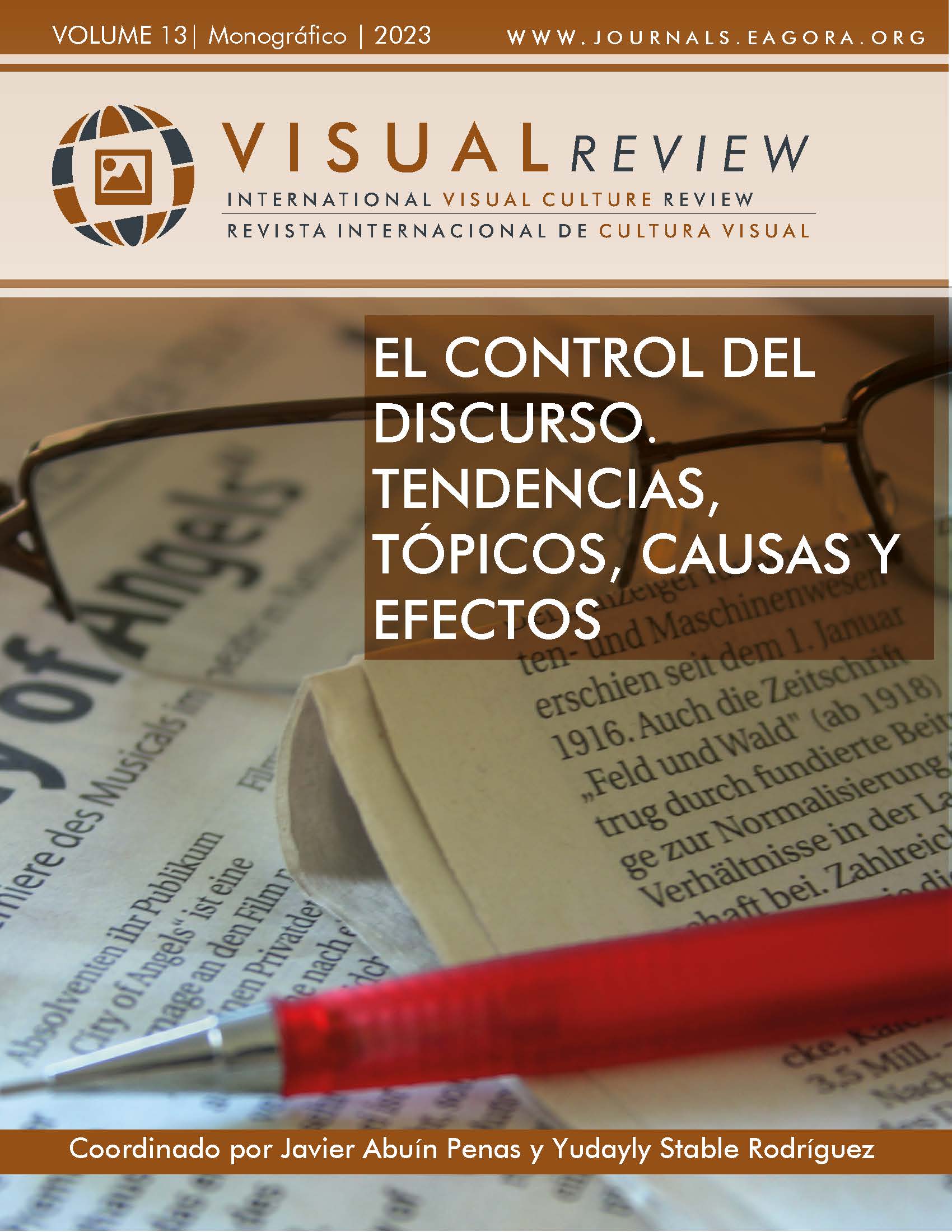Hate speech in secondary education: intellectual and emotional effects
DOI:
https://doi.org/10.37467/revvisual.v10.4600Keywords:
Emotional development, Secondary education, Discrimination, Hate speech, Intellectual formation, Homophobia, ViolenceAbstract
The objective of this work is to analyze the influence of hate speech on the intellectual formation and emotional development of high school students. The methodology used responds to a field study with a sample of 64 students, a dichotomous questionnaire is administered and another adapted to the Likert scale referring to the dimensions of hate speech, intellectual and emotional development. The results show the proliferation of violence, discrimination and exclusion in secondary schools. It is concluded that the praxis of hate speech significantly influences the intellectual formation and emotional development of the student.
Downloads
Global Statistics ℹ️
|
1233
Views
|
1577
Downloads
|
|
2810
Total
|
|
References
Abuín-Vences, N., Cuesta-Cambra, U., Niño-González, J.I., & Bengochea-González, C. (2022). Análisis del discurso de odio en función de la ideología: Efectos emocionales y cognitivos. Revista comunicar, 71(XXX), 37-48. https://doi.org/10.3916/C71-2022-03 DOI: https://doi.org/10.3916/C71-2022-03
Ávila, A., Quintero, N., & Hernández, G. (2010). El uso de estrategias docentes para generar conocimientos en estudiantes de educación superior. Omnia, 16 (3), 56-76.
Bayer, J., & Bárd, P. (2020). Hate speech and hate crime in the EU and the evaluation ofonline content regulation approaches. Policy Department for Citizens’ Rights and Constitutional Affairs. https://doi.org/10.2861/28047
Bustos, L., De Santiago, P., Martínez, M.A., & Rengifo, M. (2019). Discursos de odio: una epidemia que se propaga en la red. Estado de la cuestión sobre el racismo y la xenofobia en las redes sociales”. Mediaciones Sociales, 18(.), 25-42. http://dx.doi.org/10.5209/MESO.64527 DOI: https://doi.org/10.5209/meso.64527
Colleoni, E., Rozza, A., & Arvidsson, A. (2014). Echo chamber or public sphere? Predicting political orientation and measuring political homophily in Twitter using big data. Journal of Communication, 64(2), 317-332. https://doi.org/10.1111/jcom.12084 DOI: https://doi.org/10.1111/jcom.12084
Crawford, J.T., & Brandt, M.J. (2020). Ideological (A)symmetries in prejudice and intergroup bias. Current Opinion in Behavioral Sciences, 34(.), 40-45. https://doi.org/10.1016/j.cobeha.2019.11.007 DOI: https://doi.org/10.1016/j.cobeha.2019.11.007
Esquivel, A. (2016): “El discurso del odio en la jurisprudencia del Tribunal Europeo de Derechos Humanos”, Revista Mexicana de Derecho Consitucional, 35. https://revistas.juridicas.unam.mx/index.php/cuestiones-constitucionales/article/ view/10491/13700.
FOESSA. (2019). VIII Informe sobre exclusión y desarrollo social en España. Fundación FOESSA.
Izquierdo-Montero, A. y Aguado-Odina, T. (2020). Discursos de odio: una investigación para hablar de ello en centros educativos. Revista de Currículum y Formación de Profesorado, 24(3), 175-195. DOI: 10.30827/profesorado.v24i3.15385 DOI: https://doi.org/10.30827/profesorado.v24i3.15385
Jaramillo, L. M., & Puga, L. A (2016). El pensamiento lógico-abstracto como sustento para potenciar los procesos cognitivos en la educación. Sophia, Colección de Filosofía de la Educación, 21(.), 31-55. https://doi.org/http://dx.doi.org/10.17163/soph.n21.2016.01 DOI: https://doi.org/10.17163/soph.n21.2016.01
Lehman, B. (2020). Hate at school: Victimization and disorder associated with school avoidance. Sociological Spectrum, 40(3), 172-190. https://doi.org/10.1080/02732173.2020.1734890 DOI: https://doi.org/10.1080/02732173.2020.1734890
Mulsow, G. (2008). Desarrolho emocional: impacto em ele desarrolho humano. Educação, 31(1), 61-65. Pontifícia Universidade Católica do Rio Grande do Sul Porto Alegre, Brasil
ONU (Ed.) (2019). International migration policies. Data booklet. Statistical Papers - United Nations. https://doi.org/10.18356/0a2bc93d-en DOI: https://doi.org/10.18356/0a2bc93d-en
Pacto Internacional de Derechos Civiles y Políticos (PIDCP, 2015): Manual del discurso de odio. Artículo 9 de la Carta Africana (Banjul) de Derechos Humanos (CADHP); el artículo 13 de la Convención Americana sobre Derechos Humanos (AmCHR), y el artículo 10 de la Convención Europea de Derechos Humanos (CEDH).
Rocco, T., Bliss, L., Gallagher, Z., & Perez-Prado, A. (2003). Mixed Methods Taking the Next Step: Mixed Methods Research in Organizational Systems Research in Organizational Systems. Information Technology, Learning, and Performance Journal, 21(1), 18-29. https://www.researchgate.net/publication/253625105
Santisteban, A. (2018). El Discurso del Odio: Una investigación en la formación inicial. López, E., García, C.R., & Sánchez, M. (eds.). Buscando formas de enseñar: Investigar para innovar en Didáctica de las Ciencias Sociales, pp. 423-434. Universidad de Valladolid / AUPDCS.
Segato, R. (2018). Contrapedagogías de la crueldad. Prometeo.
Smith, M. (2019). Las emociones de los estudiantes y su impacto en el aprendizaje. Narcea.
Sosa, J. (2015). Formación intelectual y su incidencia en los niveles de aprendizaje de los estudiantes de 7mo grado de la escuela de educación básica “los girasoles” del cantón ventanas, provincia de los ríos. [Tesis de grado]. Universidad Técnica de Babahoyo.
UNESCO (2021). Combatir los discursos de odio a través de la educación, foro mundial multilateral en línea: informe de la reunión. https://unesdoc.unesco.org/ark:/48223/pf0000380290_spa
Váradi, L., Barna, I., & Németh, R. (2021). Whose norms, whose prejudice? The dynamics of perceived group norms and prejudice in new secondary school classes. Frontiers in Psychology, 11, 3621-3621. https://doi.org/10.3389/fpsyg.2020.524547 DOI: https://doi.org/10.3389/fpsyg.2020.524547
Wachs, S., Wettstein, A., Bilz, L., & Gámez-Guadix, M. (2022). Motivos del discurso de odio en la adolescencia y su relación con las normas sociales. Revista Comunicar,71(XXX), 9-20. DOI https://doi.org/10.3916/C71-2022-01 DOI: https://doi.org/10.3916/C71-2022-01
Downloads
Published
How to Cite
Issue
Section
License
Those authors who publish in this journal accept the following terms:
-
Authors retain copyright.
-
Authors transfer to the journal the right of first publication. The journal also owns the publishing rights.
-
All published contents are governed by an Attribution-NoDerivatives 4.0 International License.
Access the informative version and legal text of the license. By virtue of this, third parties are allowed to use what is published as long as they mention the authorship of the work and the first publication in this journal. If you transform the material, you may not distribute the modified work. -
Authors may make other independent and additional contractual arrangements for non-exclusive distribution of the version of the article published in this journal (e.g., inclusion in an institutional repository or publication in a book) as long as they clearly indicate that the work was first published in this journal.
- Authors are allowed and recommended to publish their work on the Internet (for example on institutional and personal websites), following the publication of, and referencing the journal, as this could lead to constructive exchanges and a more extensive and quick circulation of published works (see The Effect of Open Access).














